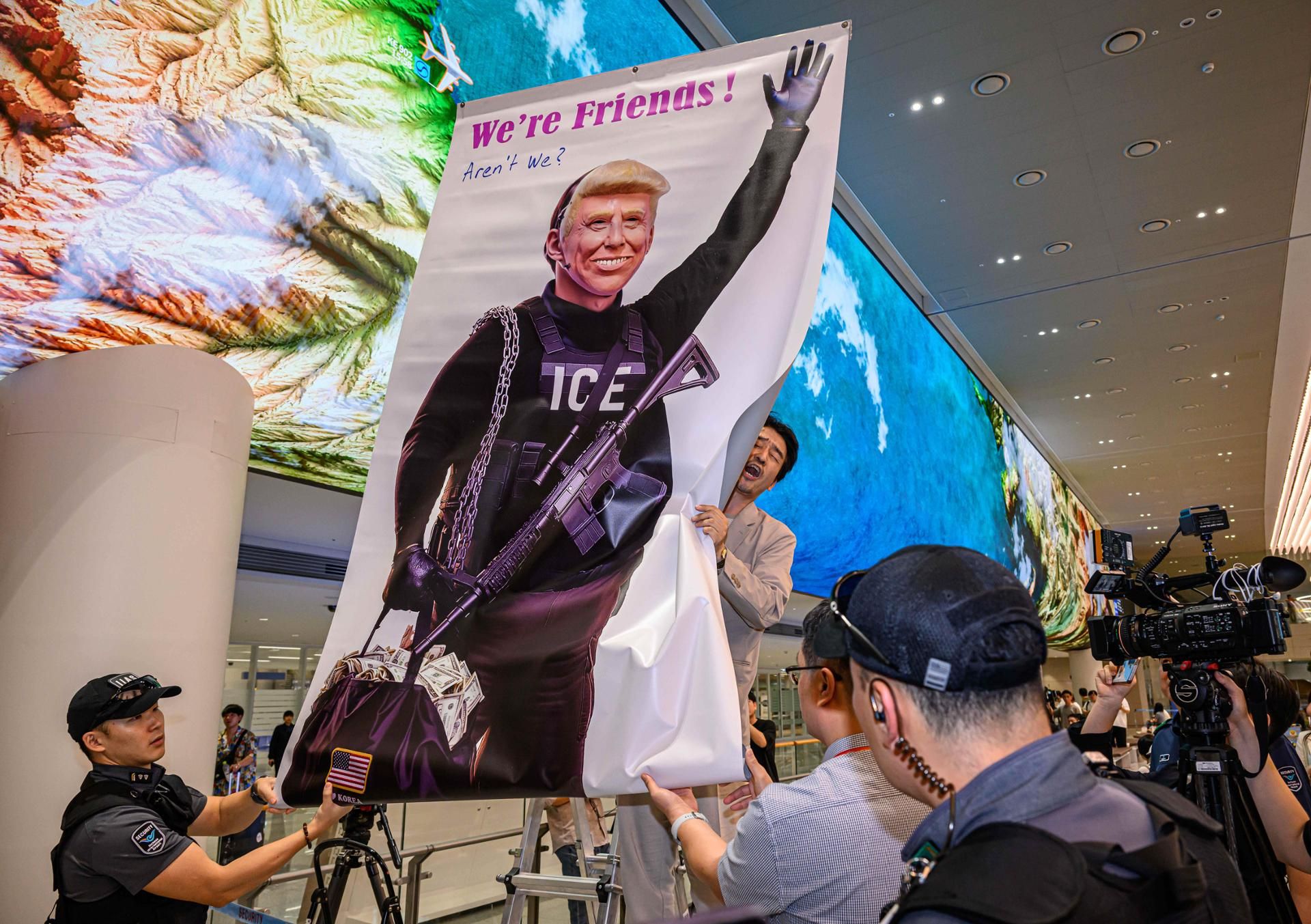Shackled and chained: Mass detention of Koreans fuels criticism of US
US deputy secretary of state expresses 'deep regret'

- September 14, 2025
Public anger toward the U.S. is intensifying in Seoul after Koreans who returned from mass arrest in Georgia on Friday described squalid detention facilities and fear-filled situations.
Korean workers detained by U.S. immigration authorities at the Hyundai Motor-LG Energy Solution joint battery plant in Georgia described the raid as terrifying, with employees shackled and handcuffed. They said the authorities were coercive, treating them all like criminals.
One worker recalled realizing it was more than a routine inspection when he saw detainees bound with leg irons and chains, noting that in some cases officers even pointed guns at them.
Another testified that during the transfer, both their hands and feet were chained, and they were held alongside people who had crossed the border illegally.
Some reported that Immigration and Customs Enforcement (ICE) agents told the detainees to sign documents without providing any explanation or informing them of their rights.
Workers said the tense atmosphere made it impossible to carefully read through and translate the documents line by line. Believing that signing the papers would secure their release, they submitted the forms, only to be arrested afterward and have their hands bound by cable ties.
Korean workers in handcuffs and chains are transferred to a detention facility after a mass raid by U.S. immigration authorities in Georgia, in this photo provided by one of the detainees after release. Yonhap
The ICE detention center in Folkston, Georgia, was described as having poor conditions, with detainees saying their basic human rights were not guaranteed.
Their belongings and phones were confiscated, and they were issued prison uniforms and identification numbers known as "alien numbers."
They were first crammed into a temporary facility with moldy mattresses and no heating. Many of them were later moved to two-person cells with toilets inside the living space, leaving little room for privacy. They added that the food was of such poor quality, it was often impossible to eat.
In the wake of these accounts, U.S. Deputy Secretary of State Christopher Landau, who is visiting Korea, expressed "deep regret" over the incident during his meeting with First Vice Foreign Minister Park Yoon-joo, according to the Ministry of Foreign Affairs, Sunday.
He promised that those who returned would face no disadvantage if they reenter the U.S., and vowed to ensure similar cases do not occur in the future. "He encouraged the two nations to take this incident as a momentum to improve the relevant [visa] system," the ministry said in a press release.
Korean workers who were detained by U.S. immigration authorities reunite with their families in the parking lot of Terminal 2 at Incheon International Airport after returning home, Friday. Korea Times photo by Shim Hyun-chul
However, despite the U.S.' regret and the two governments' moves to prevent similar cases from occurring, the revelations of harsh treatment and fear-inducing conditions during their detention led to rallies condemning the U.S. government in downtown Seoul over the weekend.
The progressive group Candlelight Action staged a march on Saturday at Gwanghwamun Station, close to the U.S. Embassy. Participants chanted slogans including, "We denounce the U.S. for arresting and detaining our people" and "Trump must apologize."
The Korean Confederation of Trade Unions (KCTU), an umbrella labor union, held a separate rally near City Hall, accusing U.S. immigration authorities of unlawfully detaining Korean workers and also criticizing the Korean government for failing to protect its citizens while yielding to U.S. pressure.
Anti-U.S. sentiment is also growing online, with the public voicing strong criticism of Washington.
Some posts questioned the alliance between the two nations, with one user writing, "These days, I wonder if the U.S. is really our ally."
Others directed blame at Washington, arguing that the U.S. refused to issue proper visas in an effort to protect its own labor market, while pushing ahead with an accelerated construction schedule that left the companies with no choice but to circumvent visa rules.
Calls have emerged for Korea to scrutinize the status of Americans working in the country, with one commenter writing, "Round up all the Americans teaching English here on tourist visas. Diplomacy should be reciprocal."
National Assembly Speaker Woo Won-shik sent letters to U.S. Vice President JD Vance, House Speaker Mike Johnson and other key congressional leaders on Friday, urging follow-up measures to prevent future cases like the one in Georgia, including a new visa quota for skilled Korean professionals.
Jung Da-hyun is a reporter at The Korea Times, covering social issues in Korea, including foreign residents, education, environment and politics. Driven by a deep interest in people’s stories, she focuses on investigative and feature reporting through direct interviews and field coverage. She received the Amnesty International Korea Media Award for her “Deepfake Crisis at Schools” series. Reach her at dahyun08@koreatimes.co.kr. Always open to hearing your stories.